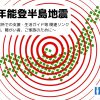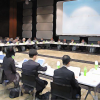ALZHEIMER’S ASSOCIATION JAPAN, MEWSLETTER
“Pole-Pole”
BULLETIN NO、296 March 2005
Summary Translation: HIROSAWA kayoko
Telephone consultation member training course
“Telephone consultation member training course” was opened at the fourth floor of the big hall of Kyoto Welfare Hall on January 22nd. 70 members from each branch took the course. This training course was sponsored by the Prevention Association(a foundation), and “Family members’ groups”(a corporation) cooperated.
It was originally planned for the people of the head office who are in charge of telephone consultation. However, a lot of people of each branch all over Japan also wanted to take it. So urgently the number of the participants was increased, and the following people were allowed to take the course: the present telephone families consultation members of “Family members’ groups”; the members who are interested in the consultation and is going to be consultants. Over the fixed number of 50 people applied for the participation.
The day before the opening, it snowed heavily along the Japan Sea area, and the organizers were afraid that there would be only the small number of participants. Actually, however, the members had arrived one day earlier. As a result, the number of these enthusiastic participants came up to 70. From 9 o’clock in the morning to 5:30 in the late afternoon, they listened to the lectures of the speakers and they seriously worked on role playing.
The participants came from far away: Chiba, Saitama, Shizuoka, Gifu, Shimane, Tokushima, Hiroshima, Fukuoka, Ooita, Kagoshima. In addition, the telephone consultants of each branch of the Kinki area and the members who are interested in it joined. As all of the participants had enough knowledge of dementia as well as care experiences, the lecturers in charge led them enthusiastically. We are very glad to have had a fruitful telephone consultation member training course.
The keynote address was given by Dr. Hisao Nagata. He is a professor of the international department of Oobirin Graduate School and also the inspector of Japan Dementia Care Congress. He spoke of “The Psychology of Dementia.” He began with such an easy test as “Little pieces of knowledge about care.” Then, the members relaxed their tension, doing some head exercises. In this way they were listening seriously in order to understand the psychology of dementia sufferers.
The next lecturers were Keiko Muto from NPO ASAHI counseling committee(the former representative) and Yumiko Horiuchi(the chief of the secretariat). They explained “The Basic Knowledge of the Telephone Consulttion.” According to the explanation, all the members joined the role playing whose theme was “My Dream.” They were divided into couples of two persons: one was the person who wanted consultation, and the other was the listener. Then, they changed the parts. In this way, they studied the importance of communication and knew how to listen. After that, they took up 3 examples and did role playing by the same couple. At the end they had a full talk about each couple.
In this training course, Miss Muto and Miss Horiuchi themselves presented role playing. Its vivid performance drew the participants’ attention and they were very much moved.
By the participants’ questionnaire, almost all of them answered that the content of this course was appropriate. What’s more, many of them were eager to be the members of the telephone consultation.
At the end of the course, Mr. Takami, President said, “We have learned much by the keynote lecture and the technical guidance. I would like to operate the training course from now on too, and expect the telephone consultation to be massive.” I also hope the headquarters’ telephone consultation will be massive and the number of the telephone consultation commissioners will increase. (Hiroharu Miyabe, Chief of the secretariat)
Care Experience from Branch Letters
Thank you very much for my mother-in-law’s gentleness.
Mrs. Mitsuko Watanabe(Nagasaki branch)
It’s 27 years since I began to live with my mother-in-law who is an Alzheimer sufferer.
She will be 91 years old this May. It was when she was 64 years old that my mother-in-law, who is young-looking, began to be unable to live alone. How time flies!
5 years before, she had the operation of gastrostomy, and she lived almost on the bed. Now, however, she is making use of the home help of long-term-care-insurance(level 5), day care, and short-term stay, living mostly in her house. I am now using an injector for the aspiration of phegm, nutrition infusion, and dosing. In addition to these things my care includes dieper change of 7~8 times a day, changing body position, changing clothes, and wiping of her body.
At the beginning of the care, I was in the state of panic to
see my mother-in-law’s behavior. I did not know what to do, just moved about in confusion, repeated tries and errors, and had the sequence of mind conflict. I was living in the hell until I recognized she was a dementia sufferer by the doctor’s diagnosis.
I wept and wept, doubting “Why do these things happen?”
Now, however, I am caring my mother-in-law pleasantly. Healed by the warmness of my mother-in-law who cannot speak, I live every day with the feeling of gratitude.
When I was not generous but nervous, my words to her were full of thorns. It took 7 years before she said to me, “Thank you,” putting her hands together. Just at that moment, I decided that I would take care of her all through her life. It was a turning point that I myself felt strange.
20 years have passed. Now, we want to do filial piety, with
“ordinary and humanly” as a motto.
Thanks to the care of my mother-in-law, I was given a lot of rewards during these 27 years. I could meet the members of “Family members’ groups.” I could go to the theater and the concert. I enjoyed inland trips with my husband as reward trips.” Last year I took a trip to Europe, which was my long-cherished desire.
Moreover, I could take part in the society by doing the work of the prefecture and the city concerning welfare. I learned a lot from every activity.
Sometimes, I was asked to talk about the care experience at some facilities. It was a good chance to let more and more people know about dementia. I wish dementia sufferers could live an ordinary life in the community. I also wish people would understand that dementia sufferers have a feeling. So I would like to give a helping hand to the community this year too.








